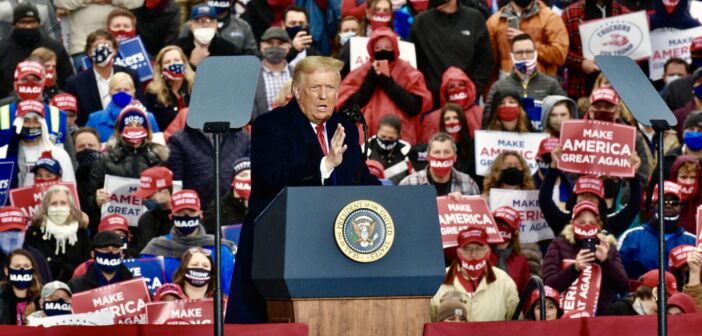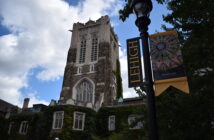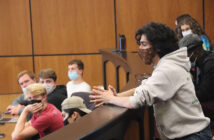For some, the decision to rescind Donald Trump’s honorary degree marked the end of a multi-year call to action, yet to others the decision was merely the first stop on a long road to the overall betterment of Lehigh University.
On Jan. 8, 2020 the Lehigh Board of Trustees voted to rescind and revoke Trump’s degree in an executive session. The announcement came following a series of comments and pleas to revoke the degree on Lehigh’s social media.
The decision has sparked a myriad of responses from students, alumni and faculty alike. While many are praising the decision made, others are questioning the intentions of the board members, some are disagreeing with the revocation altogether.
Lori Friedman, Lehigh’s media relations director, declined to comment beyond the statement released by the university.
Director of Lehigh’s Office of Multicultural Affairs, Chad Williams, initiated the most recent petition to rescind. While he declined further discussion on the decision, he shared his opinion in a statement over email.
“I support the Board of Trustees decision to rescind the honorary degree of Donald Trump,” Williams said.
The opinions of Lehigh students and alumni, however, vary significantly.

Rebecca Sitkovetsky, ‘23, disagrees entirely with the decision to rescind and said, as an institution, Lehigh should avoid political engagement.
“I believe that Lehigh as an institution, with students from all over the world who have come from all over the world, from different backgrounds should not be political at all,” Sitkovetsky said. “They rescinded the degree because they felt pressured by many liberal students who despise Trump. They did it only to gain money from alumni and for their reputation.”
Sitkovetsky is not alone in believing the decision was made to pad the school’s reputation.
Dom Ocampo, ‘22, believes the decision was made primarily to “save face.”
“I think that seeing the surge in their Instagram comments and their email inboxes of people voicing their disappointment and their anger, probably brought a lot of light to the fact that people rely on and do care about this,” Ocampo said. “Maybe there are some people on the board of trustees, who do want to do this out of an earnest respect for the minorities that are at Lehigh, but I’m inclined to say that they really don’t have the respect that they’re trying to communicate by doing this. If they really did care, this would have been resolved so long ago.”
Kacie Bogar, ‘18, however, was just happy to see the degree be rescinded. Bogar was a Lehigh student when the initial petition to rescind Trump’s degree circulated in 2016. After years of circulation and four separate petitions, she said she is “very happy this decision has finally been made.”
Bogar said she was frustrated throughout her time at Lehigh as she would witness “remarkable displays of student led activism” that the university continuously disregarded. She said those feelings of frustration arose again over the summer through the university’s response to the Black Lives Matter movement.
Bogar also attended the town hall over the summer that focused on working to transform Lehigh into an actively antiracist institution.
“There were so many students and alumni of color who all had their time to speak and were told by President Simon and other high-up administration that they were listening, and time and again it was expressed to them by these students to rescind the degree,” Bogar said. “It was really angering to me that students of color and alumni were giving their time and essentially doing unpaid labor for the university, explicitly telling them what they can do to be a better school and an antiracist university, and they were still ignored.”
Bogar said while she is happy that the decision was made, the revocation should be the bare minimum regarding action from the university.
“This in it of itself does not mean Lehigh is an antiracist institution or that all the work has been done,” she said.
 Ryan Seltz, ‘16, was a senior at the time of Trump’s election, and said he has found the university’s response to the situation both disingenuous and disheartening.
Ryan Seltz, ‘16, was a senior at the time of Trump’s election, and said he has found the university’s response to the situation both disingenuous and disheartening.
“There have been so many other petitions calling for this over the course of his administration,” Seltz said. “There have been plenty of other events that have qualified for them to rescind his degree and it all feels very emotionless, like there are definitely some ulterior motives there. It feels like they did it this time because they finally had to, because so many other people are separating themselves from Donald Trump now.”
“Too little too late,” was the sentiment expressed by alumni Jim Cameron, ‘72, who has a long list of questions for the Board of Trustees.
“Why did it take an attempted coup for the Board of Trustees to do the right thing?” Cameron asked. “Why did it take an attempted coup for them to have the courage to finally do what so many people had been asking them to do and why had they not done it sooner?”
Cameron, who donates to the university regularly, said there is a shared sentiment among many of his fellow alumni that the decision was made out of image-based necessity.
“I’m assuming that they didn’t take the position on the request to rescind earlier because they didn’t want to piss off Republican donors and alumni,” he said. “The university has been out with its hand extended under President Simon’s attempt to raise how many millions of dollars to build this new fourth college. To get involved in the politics of all that, to direct the petition directly and say yes or no, might have risked alienating potential donors which is a real world consideration, but I think is the wrong choice to have to make.”
Cameron expressed frustration over the lack of communication with alumni, specifically with donors.
“I’m hoping that the Board of Trustees communicates to me as an alumnus, what they did, why they did it and what took them so long to do it? Why didn’t they do it sooner? It’s been several weeks and I’m still waiting for that,” he said.
While Cameron said Lehigh’s handling of the situation would not stop him from donating to the university, the lack of communication makes him wary. Cameron said absent a more detailed explanation, he could see other alumni becoming “hesitant to pour money into a university which is not proactive in communicating its decision making process.”
For other potential donors, however, the situation has deterred their likelihood of giving back to the school.
Chloe Norvell, ‘21, said seeing how long it took Lehigh to decide to rescind has permanently damaged her perception of the school. 
“Lehigh waited until they could no longer be silent and complicit because they clearly value money and donors over everything,” Norvell said. “They’ve shown where their morals lie and this is just one of the many ways Lehigh has let me down in my four years as a student. The thought of giving them a penny I make after graduating is laughable.”
A common complaint among alumni was the lack of communication regarding the decision process.
Annie Henry, ‘18, served on the Student Senate when it submitted a formal request to the Board of Trustees to rescind the degree in 2018. Henry said a primary request in the letter was an explanation of the process and increased transparency in the reasoning behind their initial decision of “no action.”
“It’s just shameful,” she said. “The lack of transparency, the lack of communication from the Board of Trustees, after so much time and so much energy has come from different groups and people involved with the university, it just feels very disrespectful.”
Kelly McCoy, ‘17, who created the petition to rescind that received almost 80,000 signatures after the Charlottesville riots in 2017, said the ambiguity of the process was embarrassing for the university.
“It’s embarrassing,” she said. “It’s kind of hard to sum it up in a few descriptors, but I feel like embarrassing really encapsulates it. It’s not like we were asking them to move a mountain. It’s a degree and the person who had it didn’t even earn it, it’s symbolic.”
McCoy said symbols carry meaning, and to rescind a symbolic degree does not take a large amount of effort, but carries significant weight.
“I think it’s emblematic of deeper problems at that point. If we can’t rescind a degree that was given to someone on an honorary basis, then what power does the university truly contain to make an equitable environment on campus? I feel like that is the biggest question at this point.”
Was rescinding the degree enough?
“No, I don’t think that rescinding is enough,” Ocampo said. “They need to explicitly state that they are against white supremacy and that they are against what happened on (Jan. 6). They need to apologize to the BIPOC community and all of the alumni who have been voicing their concerns and upset over the past five years. They need to be transparent and cite what concrete steps they’re taking to become an anti-racist institution.”
 While Cameron is dissatisfied with the lack of communication, he said he would be satisfied with the decision, once given a more concrete explanation of the process and conversations had by the Board of Trustees.
While Cameron is dissatisfied with the lack of communication, he said he would be satisfied with the decision, once given a more concrete explanation of the process and conversations had by the Board of Trustees.
Seltz said the decision does not feel at all genuine, but he is hopeful the criticism pushes Lehigh in a positive direction.
Going forward, Seltz hopes Lehigh uses these circumstances as the starting point for more concrete advocacy and change.
“I hope that Lehigh really starts to shift its views and think about its current student body and its future alumni base, not just its current alumni base, and isn’t just pandering to major donors like it seems to have been the past few years,” he said. “I hope that things begin to go in a more positive direction and even outside of Lehigh that people start to listen to younger generations and don’t just accept tuition checks and call it a day.”
“From this point going forward they can be better,” Henry said.
She said the university can improve by being more timely and by actively choosing to take action before it “too late.” However, she does not believe there is much that can be done regarding compensating for the time it took for the Board of Trustees to rescind Trump’s degree.
“I think they can do actions to help, but it will not make up for their lack of action to this point,” she said. “There has to be a tragedy or a problem to arise for people to then start caring when we should be actively creating communities and environments that aren’t going to create those problems to begin with.”
Bogar hopes for increased accountability, and increased consideration of the changes and desires expressed by the student body.
“We love our school a lot and that’s why we are pushing for this kind of accountability,” she said. “It’s not that we don’t like Lehigh or regret going there. We miss it and still consider it our home, we just want it to be better.”
This article previously listed a source, Annie Wu. The source’s name is Annie Henry. This article has been adjusted accordingly.






Comment policy
Comments posted to The Brown and White website are reviewed by a moderator before being approved. Incendiary speech or harassing language, including comments targeted at individuals, may be deemed unacceptable and not published. Spam and other soliciting will also be declined.
The Brown and White also reserves the right to not publish entirely anonymous comments.